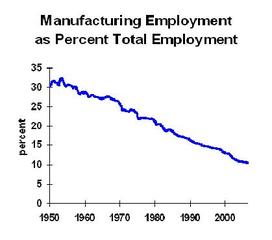Paul Krugman recently wrote:
"We have a big trade deficit and a highly inflated housing sector. One result has been that we’ve lost a lot of manufacturing jobs."
(Thanks to Brad DeLong.)
Well, let’s take a look at manufacturing jobs as a percent of total employment:
It’s hard for me to see the recent housing boom and trade deficit as causing this protracted slide. For the record, we ran a trade surplus in the 1960s, and have had a deficit ever since.
Manufacturing’s share of employment has dropped for two major reasons. First, productivity growth has been huge in manufacturing, allowing us to produce more goods with fewer workers. Second, we as consumers and businesses have chosen to purchase more services relative to goods. A larger portion of our food budget is the cost of eating out rather than the grocery store cost of food. For fun, we spend more on vacations relative to toys, books and other manufactured goods. Businesses spend more on computer software and services as part of their capital budgets, relative to the hardware they purchase.
We are never going to see a larger share of jobs in manufacturing, and we probably won’t even see much of an increase in the actual number of jobs.
Business strategy implications: If you are in manufacturing, don’t keep expecting the renaissance of the factory. There will still be profits available to well-run companies, but the external environment is not going to suddenly change to make life easier for factory managers.



